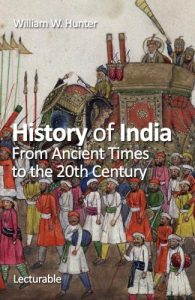The history of nearly every European country affords the historian a subject of homogeneous character for his task; not so with the history of India, for instead of one race, many must be dealt with; instead of one religion the people of India include numerous devotees of nearly all the great world faiths; instead of a single state with one form of government with a continuous history, there have been numerous states with varying governmental systems, and tribes and empires have crowded and jostled one another, with dynasty rapidly displacing dynasty. The problem is yet more difficult, for the historian of India has always the unfathomed oriental to study, and then for more than four centuries must chronicle how the men of the West have come to India to win empires, and must unravel the tangled web wrought by European and Hindu as they have lived and fought and toiled together.
Contents: The Country. The People. The Non-Aryans. The Aryans in India. Buddhism, 543 B.C.-1000 A.D. The Greeks in India, 327-161 B.C. The Scythic Inroads, 100 B.C.-725 A.D. Growth of Hinduism, 700-1500. Early Mohammedan Conquerors, 714-1526. The Mogul Dynasty, 1526-1761. The Marathas, 1650-1818. Early European Settlements, 1498-1800. Growth of British Power, 1700-1805. The Consolidation of British India, 1805-1857. The Sepoy Mutiny of 1857. India under the British Crown, 1858-1906.
Contents: The Country. The People. The Non-Aryans. The Aryans in India. Buddhism, 543 B.C.-1000 A.D. The Greeks in India, 327-161 B.C. The Scythic Inroads, 100 B.C.-725 A.D. Growth of Hinduism, 700-1500. Early Mohammedan Conquerors, 714-1526. The Mogul Dynasty, 1526-1761. The Marathas, 1650-1818. Early European Settlements, 1498-1800. Growth of British Power, 1700-1805. The Consolidation of British India, 1805-1857. The Sepoy Mutiny of 1857. India under the British Crown, 1858-1906.












